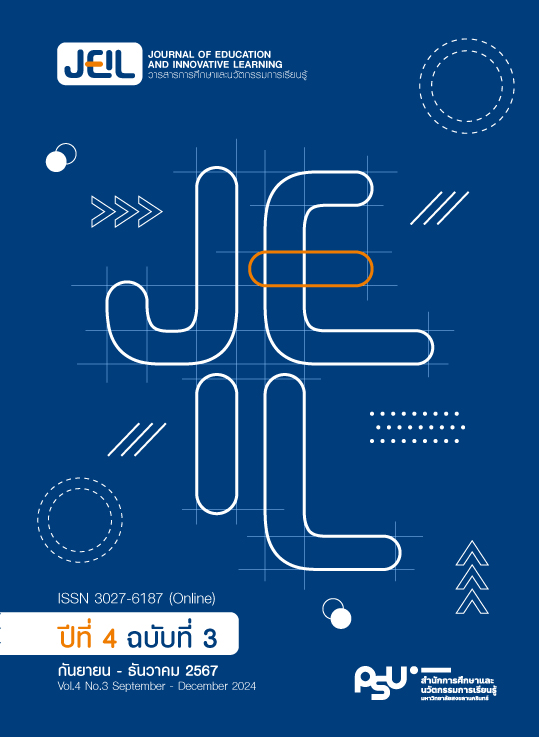รูปแบบการเรียนรู้เชิงประสบการณ์ร่วมกับแนวคิดเกมมิฟิเคชันแบบออนไลน์ที่เสริมสร้างสมรรถนะความฉลาดทางดิจิทัลของนักเรียนชั้นประถมศึกษาตอนปลาย
Main Article Content
บทคัดย่อ
การพัฒนาของเทคโนโลยีสารสนเทศและการสื่อสารในปัจจุบันส่งผลให้เด็กมีโอกาสพบความเสี่ยงจากภัยออนไลน์ได้ ซึ่งสามารถป้องกันได้โดยส่งเสริมให้มีสมรรถนะความฉลาดทางดิจิทัล อย่างไรก็ตาม ยังพบปัญหาในการจัดการเรียนรู้ เช่น รูปแบบการสอนหรือสื่อที่ยังไม่ช่วยในการสร้างความรู้ความเข้าใจและ ไม่สร้างแรงจูงใจให้กับนักเรียนอย่างเพียงพอ จึงควรมีการจัดการเรียนรู้ที่เน้นฝึกทักษะในการคิดวิเคราะห์ เรียนรู้จากการลงมือปฏิบัติและสร้างแรงจูงใจในการเรียนผ่านการจัดการเรียนรู้อย่างเป็นระบบด้วยรูปแบบการเรียนรู้เชิงประสบการณ์ร่วมกับเกมมิฟิเคชันแบบออนไลน์ เป็นการบูรณาการขององค์ประกอบหลักของทั้งสามแนวคิดในแต่ละขั้นของการจัดการเรียนรู้ ได้แก่ 1) การได้รับประสบการณ์ นักเรียนได้รับประสบการณ์ผ่านการมีส่วนร่วมระหว่างนักเรียนกับบทเรียนผ่านเรื่องราวที่มีความน่าสนใจและเป้าหมายที่ท้าทาย รวมถึงการใช้ตัวละครที่เป็นตัวแทนผู้เล่นหรืออวทาร์ 2) การสะท้อนคิด นักเรียนมีปฏิสัมพันธ์และผลป้อนกลับ โดยมีการสร้างแรงจูงใจด้วย คะแนน รางวัล ระดับของผู้เล่น 3) การคิด นักเรียนสรุปความคิดรวบยอดและอภิปรายร่วมกัน ผ่านเครื่องมือการสื่อสารรูปแบบต่าง ๆ และ 4) การปฏิบัติ นักเรียนประยุกต์ใช้ความรู้ที่ได้รับจากบทเรียนแบ่งบันความรู้ร่วมกันเป็นสังคมและมีการประเมินผลการเรียนรู้ของผู้เรียน
Article Details

อนุญาตภายใต้เงื่อนไข Creative Commons Attribution-NonCommercial-NoDerivatives 4.0 International License.
เนื้อหาและข้อมูลในบทความที่ตีพิมพ์ในวารสารการศึกษาและนวัตกรรมการเรียนรู้ ถือเป็นข้อคิดเห็นและความรับผิดชอบของผู้เขียน ซึ่งกองบรรณาธิการวารสาร ไม่จำเป็นต้องเห็นด้วยหรือร่วมรับผิดชอบใด ๆ และไม่สงวนสิทธิ์การคัดลอกบทความเพื่อใช้ประโยชน์ทางวิชาการ แต่ให้อ้างอิงข้อมูลแสดงที่มาของบทความทุกครั้งที่นำไปใช้ประโยชน์
เอกสารอ้างอิง
Altaie, M. A., & Jawawi, D. N. A. (2021). Adaptive gamification framework to promote computational thinking in 8-13 year olds. Journal of E-Learning and Knowledge Society, 17(3), 89-100. doi:10.20368/1971-8829/1135552
Bell, K. (2018). Game On!: Gamification, Gameful Design, and the Rise of the Gamer Educator. Johns Hopkins University Press.
Best, J. W. (1977). Research in Education. Prentice-Hall.
Bourne, J., & Moore, J. C. (2003). Elements of Quality Online Education: Practice and Direction. Sloan Consortium.
DQ Institute. (2019). DQ Global Standard Report 2019. Retrieved from https://www.dqinstitute.org/wp-content/uploads/2019/11/DQGlobalStandardsReport2019.pdf?fbclid=IwAR1qyaBci8DCiTqNx8o4FAM8uDmXVVtLkvfBv6nJokTnHQxF80rsRGRahJs
DQ Institute. (2020). DQ Thailand Report 2020. Retrieved from https://www.dqinstitute.org/wp-content/uploads/2020/02/26.-Thailand.pdf
DQ Institute. (2023). 2023 Child Online Safety Index. Retrieved from https://www.dqinstitute.org/impact-measure
Haynes, C. (2007). Experiential learning: Learning by doing. Retrieved from http://adulteducation.wikibook.us/index.php?title=Experiential_Learning_-_Learning_by_Doing
Honey, P., & Mumford, A. (2000). The Learning Styles Helper's Guide. Peter Honey Learning.
Jackson, M. (2016). Gamification in educational A literature review. Retrieved from https://docplayer.net/42382265-Gamification-in-education-a-literature-review.html
Kaplan, G., Bolat, Y. İ., Göksu, İ., & Özdaş, F. (2021). Improving the positive behavior of primary school students with the gamification tool "ClassDojo". İlköğretim Online, 20, 1193-1204. doi:10.17051/ilkonline.2021.01.108
Kapp, K. M. (2012). The Gamification of Learning and Instruction: Game-based Methods and Strategies for Training and Education. Wiley.
Kolb, D. A. (2014). Experiential Learning: Experience as the Source of Learning and Development. Pearson Education.
Li, A., Islam, A. Y. M. A., & Gu, X. (2021). Factors Engaging College Students in Online Learning: An Investigation of Learning Stickiness. SAGE Open, 11(4). doi:10.1177/21582440211059181
Lu, J., Bradlow, E. T., & Hutchinson, J. W. (2022). Testing Theories of Goal Progress in Online Learning. Journal of Marketing Research, 59(1), 35-60. doi:10.1177/0022243721991100
Mathes, J. (2020). A Defining Moment for Online Learning. Retrieved from https://onlinelearningconsortium.org/a-defining-moment-for-online-learning/
Ng, C. F. (2021). The Physical Learning Environment of Online Distance Learners in Higher Education – A Conceptual Model. Frontiers in Psychology, 12. doi:10.3389/fpsyg.2021.635117
Office of the Basic Education Commission. (2021). Competency-based Curriculum. Retrieved from https://cbethailand.com
Office of the National Economic and Social Development Council. (2021). (Draft) The Thridteen National Economic and Social Development Plan. Retrieved from https://www.nesdc.go.th/download/document/Yearend/2021/plan13.pdf
Phunaploy, S., Nilsook, P., & Nookhong, J. (2021). Effects of AL-MIAP-based Learning Management to Promote Digital Intelligence for Undergraduate Students Multidisciplinary Journal for Education Social and Technological Sciences, 8(1), 13-29. doi:10.4995/muse.2021.14048
Picciano, A. G. (2017). Theories and Frameworks for Online Education: Seeking an Integrated Model. Online Learning, 213, 166-190.
Rath, D. R., & Rock, C. R. (2021). Applying Kolb's experiential learning framework to investigate the safety of energy drinks in a critical thinking general education course. Journal of Food Science Education, 20(4), 228-237. doi:10.1111/1541-4329.12229
Rogers, C. R. (1969). Freedom to Learn: A View of what Education Might Become. C. E. Merrill.
Seraji, F., & Khodaveisi, S. (2019). Teachers’ professional development through online learning environment: A phenomenological study. Interdisciplinary Journal of Virtual Learning in Medical Sciences, 10(4), 40-53. Retrieved from https://ijvlms.sums.ac.ir/article_45916_6851304ff3b464d6107e8e69cff4666c.pdf
Thongwichit, W. (2022). Management of teaching and learning to promote digital intelligence. Retrieved from https://wachi-thong.blogspot.com/2022/11/blog-post.html
Uyen, B. P., Tong, D. H., & Lien, N. B. (2022). The Effectiveness of Experiential Learning in Teaching Arithmetic and Geometry in Sixth Grade. Frontiers in Education, 7. doi:10.3389/feduc.2022.858631


